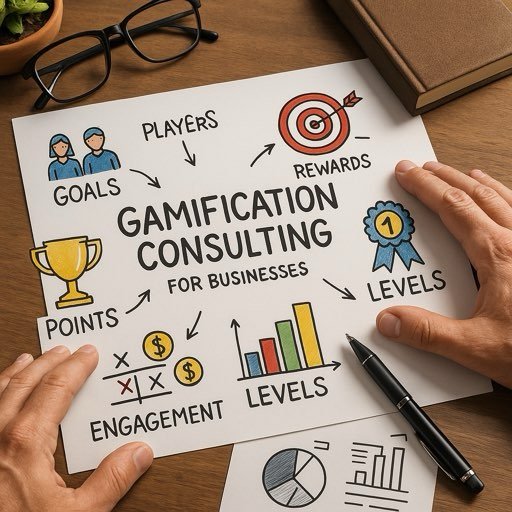What Is Gamification Consulting?
Gamification consulting involves helping businesses apply game mechanics to non-game contexts. You’re essentially designing reward systems, challenges, and progress tracking to encourage desired behaviors—whether it’s motivating employees to complete training or keeping customers coming back.
Examples of Gamification in Action
- Retail stores giving customers points for every purchase
- Corporate training programs with badges and progress levels
- Fitness apps with streaks, challenges, and leaderboards
- Sales teams competing in monthly performance contests
In all these cases, the underlying goal is the same: make people more engaged by tapping into their natural desire for achievement, competition, and recognition.
Why Businesses Are Paying for This
Gamification boosts engagement, productivity, and customer loyalty. Companies have realized that when people feel motivated and rewarded, they’re more likely to take action—and stick with it.
Skills You Need to Become a Gamification Consultant
- Understanding of game design principles
- Knowledge of behavioral psychology and motivation
- Ability to design reward systems that encourage repeat engagement
- Strong communication and presentation skills
- Analytical thinking to measure and optimize results
Do You Need a Degree?
There’s no single degree requirement, but backgrounds in psychology, business, marketing, or game design can be beneficial. Many consultants also take specialized courses in gamification design.
How Much Can You Make?
Gamification consulting can be very lucrative, especially as a niche expertise:
- Freelance Consultants: $50–$150/hour
- In-House Specialists: $60,000–$90,000/year
- Senior or Niche Experts: $100,000+/year
Rates often depend on the industry and the scale of the project.
Step-by-Step Guide to Starting Your Career
- Learn the Basics: Study game mechanics and how they can be applied to non-game settings.
- Build a Portfolio: Create sample gamification concepts for different industries.
- Choose a Niche: Corporate training, retail loyalty programs, health and fitness, or education.
- Get Certified: Take gamification courses or certifications to boost credibility.
- Network with Businesses: Attend industry events, join LinkedIn groups, and connect with potential clients.
- Start Small: Offer your services to small businesses or startups to gain testimonials.
- Scale Up: Use results and case studies to pitch larger companies.
Where to Find Clients
- LinkedIn outreach
- Business networking events
- Freelance marketplaces (Upwork, Fiverr)
- Referrals from marketing or HR professionals
A Day in the Life of a Gamification Consultant
Your work might include brainstorming new reward systems, creating mockups of game-like interfaces, running workshops with employees, and analyzing engagement data to see if your strategies are working.
Pros
- High-demand niche
- Creative and analytical work
- Opportunities to work across multiple industries
Cons
- Requires continual learning and adaptation
- Some clients may be skeptical of gamification
- Success depends on effective execution and buy-in
Final Thoughts
Gamification consulting is a perfect blend of creativity, psychology, and strategy. As more companies recognize the power of game-like incentives, this career path is only going to grow. If you enjoy designing engaging systems that motivate people, gamification consulting could be your next big move.


